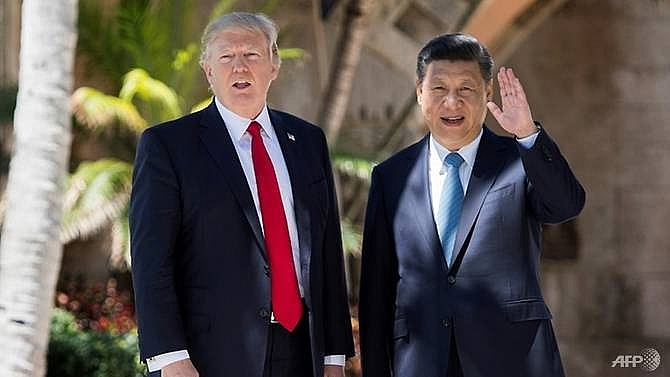Trump to announce China trade sanctions on Thursday
 |
| Donald Trump had lambasted China over its trade practices. (AFP/JIM WATSON) |
Spokesman Raj Shah told AFP that Trump will announce actions following an "investigation into China's state-led, market-distorting efforts to force, pressure, and steal US technologies and intellectual property."
Beijing has already warned the Trump administration against the move, urging him not act "emotionally."
It is just weeks since Trump short-circuited White House deliberations and announced a raft of sanctions on foreign-produced steel and aluminium off the cuff.
That move prompted the resignation of top economic advisor Gary Cohn, a stock market selloff, legal disputes and threats of retaliatory measures.
On Wednesday, Federal Reserve Chairman Jerome Powell warned that the prospect of a trade war as a growing threat to the world's largest economy.
But the impulsive president is showing no sign of backing down.
US Trade Representative Robert Lighthizer recently put a separate proposed package of US$30 billion in tariffs on Chinese imports on Trump's desk.
And Trump appears to have agreed to at least that amount, as he tries to fulfil campaign promises to get tough on "cheating" by US trade partners, which he says have destroyed American jobs.
The US trade deficit with China ran to a record US$375 billion last year - but US exports to the country were also at a record.
Washington has long accused Beijing of forcing US companies to turn over proprietary commercial information and intellectual property as a condition of operating in China.
Trump claims to have built up a generally good relationship with his Chinese counterpart Xi Jinping whom he has praised for his role in pressuring North Korea over its nuclear programme.
However, the trade dispute threatens to cast a pall over those relations, especially given the recent warnings from Beijing.
A LAUNDRY LIST OF GRIEVANCES
A senior official in Lighthizer's office said on Wednesday that the Clinton, Bush and Obama administrations had attempted over the decades to coax China into respecting market economics and trade liberalisation, but had all failed.
The Trump administration opened an investigation last August, acting on a series of allegations against China - including that as a condition of doing business, China forces US companies to enter joint ventures and transfer technology and trade secrets to domestic partners and that US companies are not able to license intellectual property in China as freely as Chinese companies.
US officials also allege China has hacked US networks and conducted industrial espionage to steal US intellectual property.
Chinese President Xi Jinping sent his top economics advisor Liu He to Washington this month to discuss the tensions of trade, but the US official said that at no point had the Chinese made a constructive proposal.
"Certainly by November, the background was such that officials in China had reason to know about the concerns we've raised ... At least, as of today the administration has not been satisfied with the types of responses we've been getting from China," the senior official in Lighthizer's office said, speaking on condition of anonymity in a briefing to reporters.
"Obviously the president will have the final say in terms of what we end up doing here."
"As a general matter, we do have very strong evidence that China uses foreign ownership restrictions such as joint venture requirements and foreign equity limitations to require or pressure technology transfer from US companies to Chinese entities," he added.
"These are all deeply concerning to the administration and really very severe questions about China and its commitment to the type of market-oriented practices that they promised to engage in for so many years."
What the stars mean:
★ Poor ★ ★ Promising ★★★ Good ★★★★ Very good ★★★★★ Exceptional
Related Contents
Latest News
More News
- Russian President congratulates Vietnamese Party leader during phone talks (January 25, 2026 | 09:58)
- Worldwide congratulations underscore confidence in Vietnam’s 14th Party Congress (January 23, 2026 | 09:02)
- Political parties, organisations, int’l friends send congratulations to 14th National Party Congress (January 22, 2026 | 09:33)
- 14th National Party Congress: Japanese media highlight Vietnam’s growth targets (January 21, 2026 | 09:46)
- 14th National Party Congress: Driving force for Vietnam to continue renewal, innovation, breakthroughs (January 21, 2026 | 09:42)
- Vietnam remains spiritual support for progressive forces: Colombian party leader (January 21, 2026 | 08:00)
- Int'l media provides large coverage of 14th National Party Congress's first working day (January 20, 2026 | 09:09)
- Vietnamese firms win top honours at ASEAN Digital Awards (January 16, 2026 | 16:45)
- ASEAN Digital Ministers' Meeting opens in Hanoi (January 15, 2026 | 15:33)
- ASEAN economies move up the global chip value chain (December 09, 2025 | 13:32)

 Tag:
Tag:




















 Mobile Version
Mobile Version